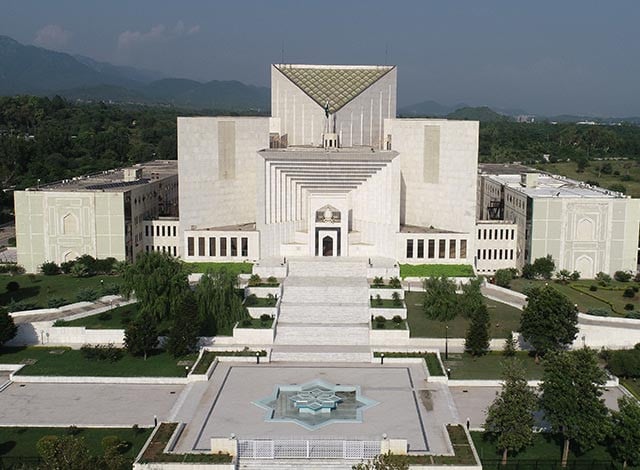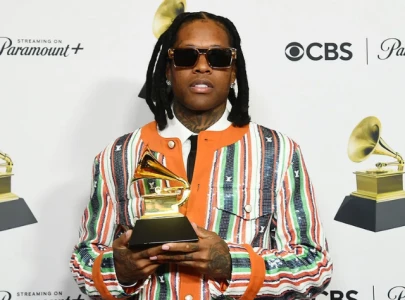
Despite endorsing the formation of an inquiry commission by a majority vote, the Supreme Court - led by Chief Justice of Pakistan (CJ) Qazi Faez Isa - has been compelled to take suo motu notice of a letter penned by six Islamabad High Court judges regarding interference of secret agencies in judicial functions.
Everyone is surprised by the SC’s U-turn on the issue. However, there may be several reasons for this change of hearts. According to sources, a minority of the SC judges wanted the apex court to take up the matter rather than referring it to the executive for the constitution of an inquiry commission.
Some lawyers believe that the main reason behind taking suo motu notice is recusal of former chief justice Tassaduq Hussain Jilliani, who was earlier chosen to lead the proposed commission.
The source said Justice (retd) Jillani was told that a full-court had endorsed his nomination. However, later he learnt that his nomination was not approved in the full-court meeting and the SC judges were divided on the question of formation of an inquiry commission.
They revealed to The Express Tribune that the former chief justice also asked the government to provide the minutes of the full-court meeting but the same was not given.
Some lawyers close to him also advised him not to embroil himself in this controversy. After talking to several individuals, Jillani decided not only to recuse himself from leading the inquiry commission but also questioned the legality of the commission as well as its term of references (TORs) in a letter. His letter was a setback for both the government as well as the judges who wanted an inquiry commission to probe the matter.
Some lawyers, however, said CJ Isa realized that the strategy should be changed in the IHC letter case after he faced criticism by lawyers and others and later decided to take suo motu notice after consultation with two senior most SC judges. CJ Isa finds himself in a battle of perception.
The government and powerful circles are not facing any difficulty during his tenure.
However, the PTI which is the largest party in the country, is showing mistrust and demanding his resignation. Several lawyers who had backed CJ Isa when a presidential reference was filed against him are now expressing disappointment with him particularly after his January 13 order which resulted in depriving the PTI of its elections symbol.
Now it is a big challenge for CJ Isa to ensure that judicial proceedings are not manipulated by state institutions in high profile cases. It will be interesting to see whether the SC on Wednesday supports the stance of the six IHC judges or the executive. There is division within the Supreme Court on the question of dealing with the letter issue.
A senior government official said that the inquiry commission was formed on the SC’s request. Now if the SC wants to intervene, he said, the government has no objection to it. However, he wondered how the SC could decide a factual controversy.
It is also being suggested that the SC should pass a ruling in order to secure independence of judges from the powerful circles for future. Tomorrow’s hearing will make it clear as to whether it is tactical retrieval or there is something else behind initiation of suo motu proceedings. Abdul Moiz Jafferii advocate said the SC had to revisit its decision to offer the six IHC judges as “sacrificial lambs” to the executive due to the widespread condemnation of the decision.
“A critical role was played by former CJ Jillani, who not only recused himself from the sham commission that a very confident government had notified, but also made it clear why such a commission could not deliver on any of the requests made by the IHC judges which could be best determined by the judiciary itself through the SJC to whom the letter was addressed,” he added.
Jafferii stated that there was also significant pressure from within the court, as the members of the bench who saw this as a capitulation were reportedly vocal in their dissent.
“This is a welcome turn, but it must be stressed that it is only a beginning. The judiciary must put on a united front through a full-court when it is next available and ask this government to behave itself.
“It must do so to reinstate the confidence not only of these six superior judges but of every judicial officer in the country, who faces varying degrees of executive pushback on a daily basis,” he added.
Former additional attorney general Tariq Mahmood Khokhar said the initial recourse to the executive for a commission of inquiry was an extra-judicial blunder.
“It represented a betrayal of the judges and constituted an abdication of responsibility, the right and duty, to guard the judiciary; it raised the specter of judicial ruin.
“Now we have a complete volte-face. It marks a shift in the CJ’s position, but there is an apprehension that the linkage between the judges’ complaint and their ‘misconduct’ remains intact ‘necessitating’ a joint investigation team (JIT).
“That would be a blunder of an even greater magnitude. Even with the best of intentions, no single minnow nor a school of minnows can hold raw power to account.
“The point is to guard the judiciary from ‘state coercion’ and not to set the stage for another purge of the judges for refusing to kowtow,” Khokhar added.


















COMMENTS (2)
Comments are moderated and generally will be posted if they are on-topic and not abusive.
For more information, please see our Comments FAQ